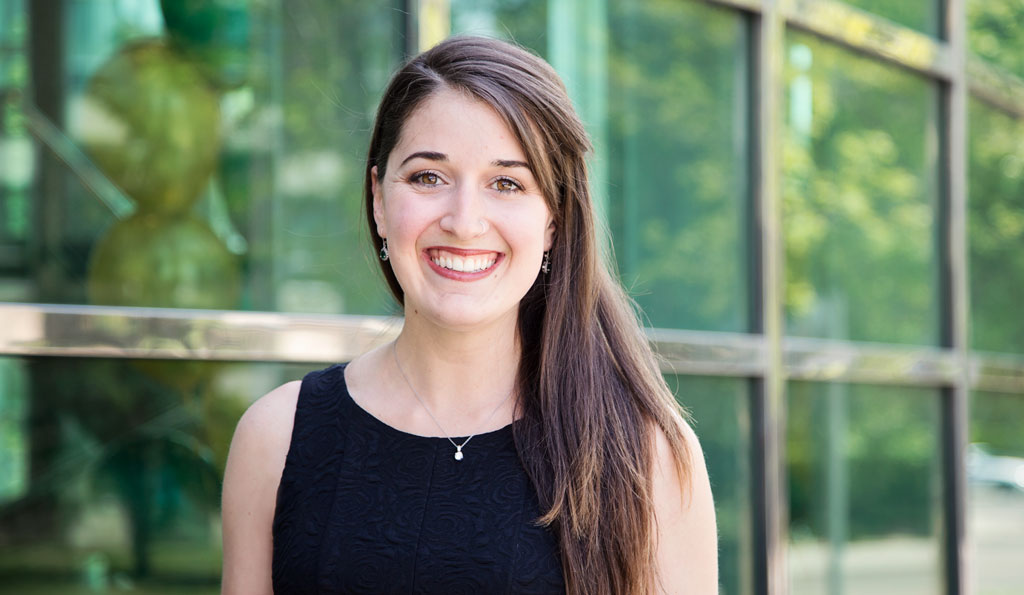
Christina Velasco (MPH '18) is helping develop palliative care services that don't leave anyone behind.
Christina Velasco wasn't always passionate about palliative care. In fact, it wasn't until the beginning of 2017 that she truly started to understand its importance.
"For me, palliative care existed as an abstract concept that I was afraid to think about," explains Velasco. "It represented dying, so I didn't really want to know about it. I quickly realized that we can't avoid it. We are all human and we will all know someone at some point in our lives who will need to benefit from these services."
In January 2017, Velasco was midway through her master of public health program in health policy and management when she received a phone call from her family in Toronto. Her father had been diagnosed with pancreatic cancer. The cancer had metastasized and was terminal. His only treatment option was chemotherapy-a treatment that would buy him precious time. Velasco immediately took a leave of absence from her program and moved home to care her father in his final months.
By going through the patient pathway with her father, Velasco was introduced to Cancer Care Ontario (CCO). CCO provides evidence-based knowledge and tools to help prevent cancer and deliver high-quality care. They conduct policy research and use the pre-existing clinical evidence base to inform what policies and programs should be implemented province-wide.
"The work that Cancer Care Ontario does is vital for the policies and programs offered by the province," says Velasco. "Ontario has a standardized system of cancer care. No matter who you are or where you live, you will receive the same care anywhere in the province. This is essential."
But because Velasco's father's cancer was terminal, she also lived through the palliative care patient journey as well.
"We had the privilege of having him home with us so the whole family could be with him-this was incredibly valued and special," says Velasco. "The quality of care he and our family received from the palliative care team was inspiring."
And although she and her family had an overall positive experience and are grateful for the care provided, she couldn't help but think critically through her public health lens about ways to improve the experience.
"I would put on my public health hat and start thinking about if I could design a system, or paint a picture of palliative care, what would I shift? What would I implement? What would I add?" says Velasco. "Palliative care is a public health issue. Just like the way cancer care is structured in Ontario, we need to make sure palliative care services are available to everyone-no matter who you are or where you live in Canada."
So when Velasco started exploring options for her capping project in the fall of 2017, she suggested CCO to her advisors Dev Menon and Tania Stafinski based on her new found interest and personal experience.
Menon and Stafinski immediately connected her with Taylor Martin, then interim manager of the Ontario Palliative Care Network (OPCN) Secretariat and Fellow of the School of Public Health's Fellowship in Health System Improvement. The OPCN, along with Health Quality Ontario (HQO), had developed new policy recommendations to standardize palliative care, like cancer care, in Ontario. The recommendations were to be piloted in four different regions in the province. This immediately caught Velasco's attention.
"When I met Taylor, I felt like it was the perfect meeting of worlds," explains Velasco. "I would have an opportunity to contribute to an experience that I felt passionate about and that I lived."
As part of her capping project, Velasco had planned to develop an evaluation framework for the OPCN. However, as she embarked on her research, she discovered a pre-existing framework that Health Quality Ontario had already developed, so she and Stafinski worked with Martin to identify work that was needed for the implementation of the framework. Together, they developed benchmarks and targets for the OPCN to use during the pilots.
Now graduated and with a new passion in palliative care, Velasco will continue her work with Menon and Stafinski through the School's new Centre for Health System Improvement. Velasco will work with stakeholders in palliative care to determine ways of harnessing community capacity to support palliative care in rural and remote communities across Alberta
"Health doesn't end at the diagnosis of a terminal illness," explains Velasco. "So we need to insure we are offering the best quality care and services to our entire population and that we aren't leaving anyone behind."
"We all have the right to die with dignity and with grace. And if we can develop care and services that can support the patient, and the caregivers, family and friends while they face the trauma of losing someone they love? To me, there's nothing more important than that."